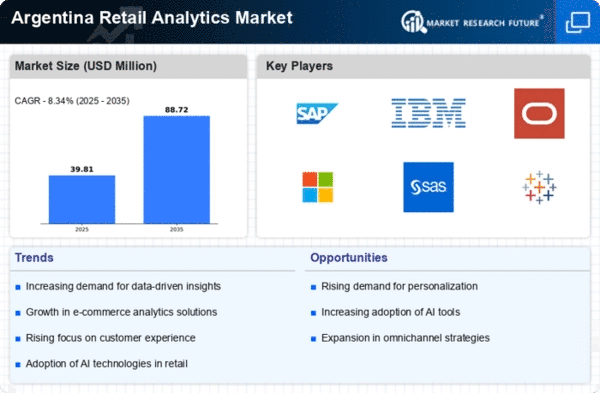Growing E-Commerce Sector
The retail analytics market in Argentina is experiencing a notable boost due to the rapid expansion of the e-commerce sector. As more consumers turn to online shopping, retailers are increasingly leveraging analytics to understand consumer behavior and preferences. In 2025, e-commerce sales in Argentina are projected to reach approximately $20 billion, indicating a growth rate of around 30% compared to previous years. This surge compels retailers to adopt advanced analytics solutions to optimize inventory management, enhance customer targeting, and improve overall operational efficiency. Consequently, the retail analytics market is likely to see heightened demand as businesses seek to harness data-driven insights to remain competitive in this evolving landscape..
Demand for Personalization
In the retail analytics market, the demand for personalized shopping experiences is becoming a critical driver. Argentine consumers are increasingly expecting tailored recommendations and offers based on their shopping history and preferences. Retailers are utilizing analytics to segment their customer base and deliver personalized marketing campaigns, which can lead to higher conversion rates. Reports suggest that personalized marketing can increase sales by up to 20%. As retailers strive to meet these expectations, the retail analytics market is poised for growth, with businesses investing in sophisticated data analysis tools to enhance customer engagement and loyalty.
Integration of Omnichannel Strategies
The integration of omnichannel strategies is significantly influencing the retail analytics market in Argentina. Retailers are recognizing the importance of providing a seamless shopping experience across various channels, including physical stores, online platforms, and mobile applications. This shift necessitates the use of analytics to track customer interactions and preferences across different touchpoints. In 2025, it is estimated that omnichannel customers will spend 30% more than single-channel customers. As a result, the retail analytics market is likely to expand as businesses seek to implement comprehensive analytics solutions that facilitate a cohesive customer journey and enhance overall satisfaction.
Regulatory Compliance and Data Privacy
Regulatory compliance and data privacy concerns are emerging as significant drivers in the retail analytics market. In Argentina, businesses are increasingly required to adhere to stringent data protection regulations, which necessitate the implementation of robust analytics solutions that ensure compliance while still providing valuable insights. the retail analytics market is adapting to these challenges by offering tools that analyze consumer data while also prioritizing security and privacy.. As companies navigate the complexities of data regulations, the demand for compliant analytics solutions is expected to rise, further propelling the growth of the retail analytics market.
Advancements in Data Processing Technologies
Advancements in data processing technologies are playing a pivotal role in shaping the retail analytics market in Argentina. The emergence of big data and cloud computing has enabled retailers to process vast amounts of data more efficiently and cost-effectively. This technological evolution allows for real-time analytics, which is crucial for making informed business decisions. In 2025, it is anticipated that the market for big data analytics in retail will reach $5 billion in Argentina. As retailers increasingly adopt these technologies, the retail analytics market is likely to witness substantial growth, driven by the need for timely insights and improved decision-making capabilities.
















